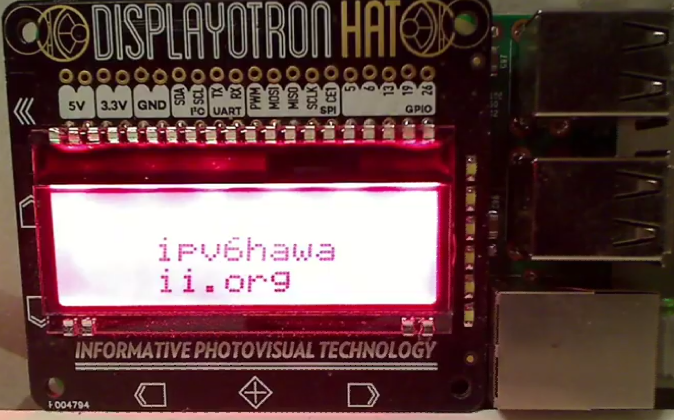
|
Everyone knows (by now) that IPv6 is an 128 bit address. And most know that the least significant 64 bits is the Interface ID (IID). That is 2^64 or 18,446,744,073,709,551,616 hosts per /64 prefix (think: subnet). But no one expects we will fill networks with that many hosts per prefix. IPv6 prefixes are part of the mind-change from IPv4, where subnets are tightly packed with hosts, to sparsely populated prefixes.
Consuming IPv6 Address space
But what if a host occupied all of the addresses in a /64 prefix? We all know that IPv6 hosts typically have more than one IPv6 address per interface. But can an interface have 2^64 addresses?
Well, probably your OS won’t allow anywhere near that number of addresses. But with a relatively simple Python program, a lowly Raspberry Pi can listen on all of those addresses simultaneously.
Fun with 2^64 Addresses
This summer I discovered ipv6board, a project run out of Sweden running on a Raspberry Pi streaming a short SMS style message that anyone can write to. You can view the Raspberry Pi display at ipv6board.best-practice.se (unfortunately, the author is having a problem the streaming video part, and may be off-line)
From the ipv6board website, one encodes ASCII into the last 8 bytes (the IID) of an addresses, and pings the ipv6board. The ASCII encoded message will show up on the Raspberry Pi’s 8×3 display. Pinging 2001:6b0:1001:105:4177:6573:6f6d:6521 will print “Awesome!” to the board.

Encoding ASCII
This is all fun, but converting text to ASCII by hand becomes tiresome fairly quickly. I thought, why not have a computer do the ASCII conversion, and pop those 8 bytes into an IPv6 address and send it off to the IPv6Board.
I decided to write a conversion program in shell script, because I wanted it to run everywhere (even on my OpenWrt router). The script takes a message argument, converts it to ASCII, and then pings the ipv6board.
$ ./ipv6board.sh "IPv6 Bd"
PING 2001:6b0:1001:105:4950:7636:2042:6420(2001:6b0:1001:105:4950:7636:2042:6420) 56 data bytes
--- 2001:6b0:1001:105:4950:7636:2042:6420 ping statistics ---
1 packets transmitted, 0 received, 100% packet loss, time 0ms
pau
Run it multiple times (with different messages) to fill the screen of IPv6board. ipv6board.sh is open source and hosted on github.com/cvmiller/ipv6board.sh.
How much address space do we need?
Clearly, 8 bytes is too small to write tweets. Perhaps the version of IP after IPv6 will have even more bytes so we can write a haiku poem. But for now, enjoy the Summer Fun with IPv6 today.